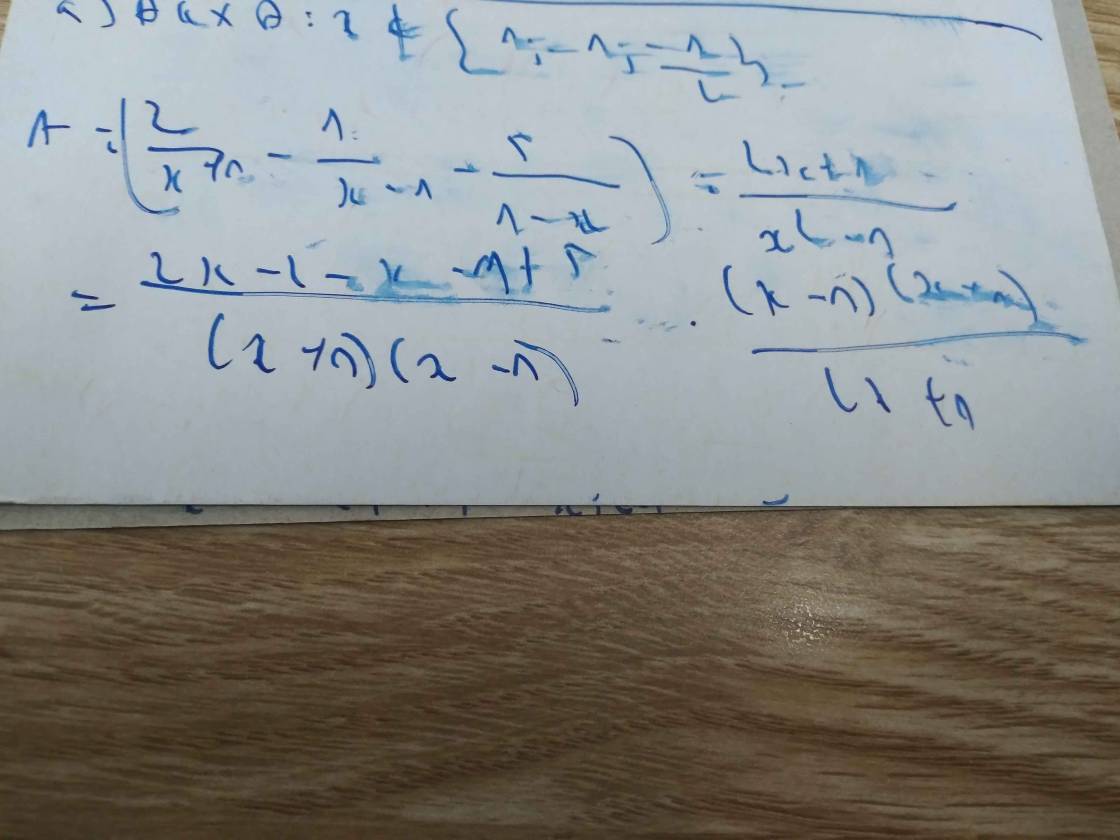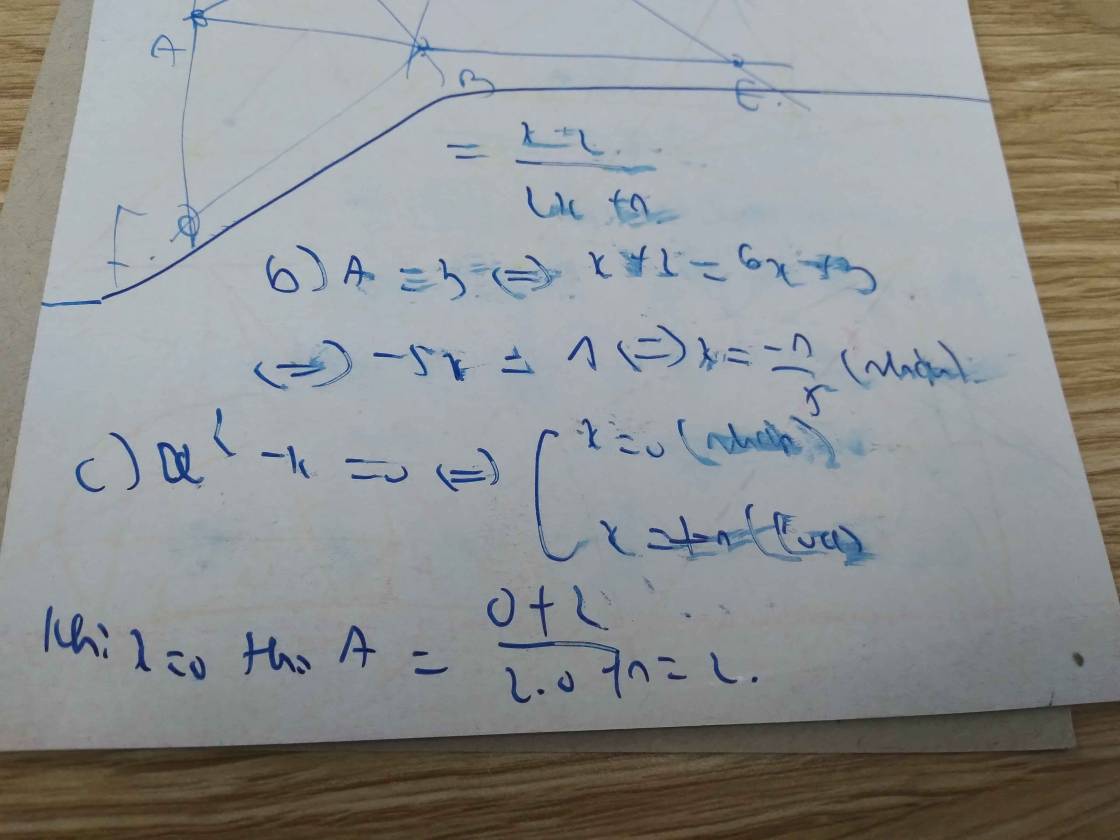Hãy nhập câu hỏi của bạn vào đây, nếu là tài khoản VIP, bạn sẽ được ưu tiên trả lời.

`đk:x ne 0,-2`
`a)D=(x/(x+2)+(8x+8)/(x^2+2x)-(x+2)/x):((x^2-x-3)/(x^2+2x)+1/x)`
`=((x^2+8x+8-x^2-4x-4)/(x(x+2))):((x^2-x-3+x+2)/(x(x+2)))`
`=(4x+4)/(x(x+2)):(x^2-1)/(x(x+2))`
`=(4x+4)/(x^2-1)(x ne +-1)`
`=4/(x-1)`
`b)x(x-2)-(x-2)=0`
`<=>(x-2)(x-1)=0`
Vì `x ne 1=>x-1 ne 0`
`=>x-2=0<=>x=2`
`=>D=4/(2-1)=4`
`c)D<0`
Mà `4>0`
`=>x-1<0`
`=>x<1`
Kết hợp đkxđ:
`=>x<1,x ne 0,x ne -2`
`d)D=2`
`<=>4/(x-1)=2`
`<=>2/(x-1)=1`
`<=>x-1=2`
`<=>x=3(tm)`

a: \(A=\left(\dfrac{x}{x^2-4}+\dfrac{4}{x-2}+\dfrac{1}{x+2}\right):\dfrac{3x+3}{x^2+2x}\)
\(=\dfrac{x+4x+8+x-2}{\left(x-2\right)\left(x+2\right)}\cdot\dfrac{x\left(x+2\right)}{3\left(x+1\right)}\)
\(=\dfrac{6\left(x+1\right)\cdot x\left(x+2\right)}{3\left(x+1\right)\left(x-2\right)\left(x+2\right)}\)
\(=\dfrac{2x}{x-2}\)

Câu 1 :
a) ĐKXĐ : \(\hept{\begin{cases}x+1\ne0\\2x-6\ne0\end{cases}}\) \(\Leftrightarrow\hept{\begin{cases}x\ne-1\\x\ne3\end{cases}}\)
b) Để \(P=1\Leftrightarrow\frac{4x^2+4x}{\left(x+1\right)\left(2x-6\right)}=1\)
\(\Leftrightarrow\frac{4x^2+4x-\left(x+1\right)\left(2x-6\right)}{\left(x+1\right)\left(2x-6\right)}=0\)
\(\Rightarrow4x^2+4x-2x^2+4x+6=0\)
\(\Leftrightarrow2x^2+8x+6=0\)
\(\Leftrightarrow x^2+4x+4-1=0\)
\(\Leftrightarrow\left(x+2-1\right)\left(x+2+1\right)=0\)
\(\Leftrightarrow\orbr{\begin{cases}x+1=0\\x+3=0\end{cases}}\) \(\Leftrightarrow\orbr{\begin{cases}x=-1\left(KTMĐKXĐ\right)\\x=-3\left(TMĐKXĐ\right)\end{cases}}\)
Vậy : \(x=-3\) thì P = 1.

a) ĐKXĐ: \(x\notin\left\{3;-3;-2\right\}\)
Ta có: \(P=\left(\dfrac{2x-1}{x+3}-\dfrac{x}{3-x}-\dfrac{3-10x}{x^2-9}\right):\dfrac{x+2}{x-3}\)
\(=\left(\dfrac{\left(2x-1\right)\left(x-3\right)}{\left(x+3\right)\left(x-3\right)}+\dfrac{x\left(x+3\right)}{\left(x-3\right)\left(x+3\right)}-\dfrac{3-10x}{\left(x-3\right)\left(x+3\right)}\right):\dfrac{x+2}{x-3}\)
\(=\dfrac{2x^2-6x-x+3+x^2+3x-3+10x}{\left(x-3\right)\left(x+3\right)}:\dfrac{x+2}{x-3}\)
\(=\dfrac{3x^2+6x}{\left(x-3\right)\left(x+3\right)}:\dfrac{x+2}{x-3}\)
\(=\dfrac{3x\left(x+2\right)}{\left(x-3\right)\left(x+3\right)}\cdot\dfrac{x-3}{x+2}\)
\(=\dfrac{3x}{x+3}\)
b) Ta có: \(x^2-7x+12=0\)
\(\Leftrightarrow x^2-3x-4x+12=0\)
\(\Leftrightarrow x\left(x-3\right)-4\left(x-3\right)=0\)
\(\Leftrightarrow\left(x-3\right)\left(x-4\right)=0\)
\(\Leftrightarrow\left[{}\begin{matrix}x-3=0\\x-4=0\end{matrix}\right.\Leftrightarrow\left[{}\begin{matrix}x=3\left(loại\right)\\x=4\left(nhận\right)\end{matrix}\right.\)
Thay x=4 vào biểu thức \(P=\dfrac{3x}{x+3}\), ta được:
\(P=\dfrac{3\cdot4}{4+3}=\dfrac{12}{7}\)
Vậy: Khi \(x^2-7x+12=0\) thì \(P=\dfrac{12}{7}\)

a) \(ĐKXĐ:x\ne\pm2\)
\(D=\frac{3x}{x-2}+\frac{2}{x+2}-\frac{14x-4}{x^2-4}:\frac{x\left(x-1\right)}{x+2}\)
\(\Leftrightarrow D=\frac{3x^2+6x+2x-4-14x+4}{\left(x-2\right)\left(x+2\right)}\cdot\frac{x+2}{x\left(x-1\right)}\)
\(\Leftrightarrow D=\frac{3x^2-6x}{x\left(x-1\right)\left(x-2\right)}\)
\(\Leftrightarrow D=\frac{3x\left(x-2\right)}{x\left(x-1\right)\left(x-2\right)}\)
\(\Leftrightarrow D=\frac{3}{x-1}\)
b) Khi \(\left|x-1\right|-3=0\)
\(\Leftrightarrow\left|x-1\right|=3\)
\(\Leftrightarrow\orbr{\begin{cases}x-1=3\\1-x=3\end{cases}}\)
\(\Leftrightarrow\orbr{\begin{cases}x=4\left(tm\right)\\x=-2\left(ktm\right)\end{cases}}\)
Thay \(x=4\)vào D ta được :\(D=\frac{3}{4-1}=1\)
c) Để D có giá trị nguyên
\(\Leftrightarrow\frac{3}{x-1}\)có giá trị nguyên
\(\Leftrightarrow x-1\inƯ\left(3\right)=\left\{\pm1;\pm3\right\}\)
\(\Leftrightarrow x\in\left\{0;2;-2;4\right\}\)
Loại bỏ giá trị \(x=\pm2\)không làm cho biểu thức có nghĩa
Vậy để D có giá trị nguyên \(\Leftrightarrow x\in\left\{0;4\right\}\)
Khi làm bài thì chỉnh lại giúp bạn cái đề:
\(D=\left(\frac{3X}{X-2}+\frac{2}{X+2}-\frac{14X-4}{X^2-4}\right):\frac{X\left(X-1\right)}{X+2}\)


Lời giải:
a. ĐKXĐ: $x\neq 1$
\(P=\frac{x^2+2}{(x-1)(x^2+x+1)}+\frac{2(x-1)}{(x-1)(x^2+x+1)}-\frac{x^2+x+1}{(x-1)(x^2+x+1)}\)
\(=\frac{x^2+2+2x-2-x^2-x-1}{(x-1)(x^2+x+1)}=\frac{x-1}{(x-1)(x^2+x+1)}=\frac{1}{x^2+x+1}\)
b.
$x^2-x=0\Leftrightarrow x(x-1)=0$
$\Leftrightarrow x=0$ hoặc $x=1$
Vì $x\neq 1$ theo ĐKXĐ nên $x=0$
Khi đó: $P=\frac{1}{0^2+0+1}=1$
c.
Ta thấy:
$1>0$
$x^2+x+1=(x+\frac{1}{2})^2+\frac{3}{4}\geq \frac{3}{4}>0$ với mọi $x\neq 1$
$\Rightarrow P=\frac{1}{x^2+x+1}>0$
Hay $P$ luôn dương với mọi $x\neq 1$